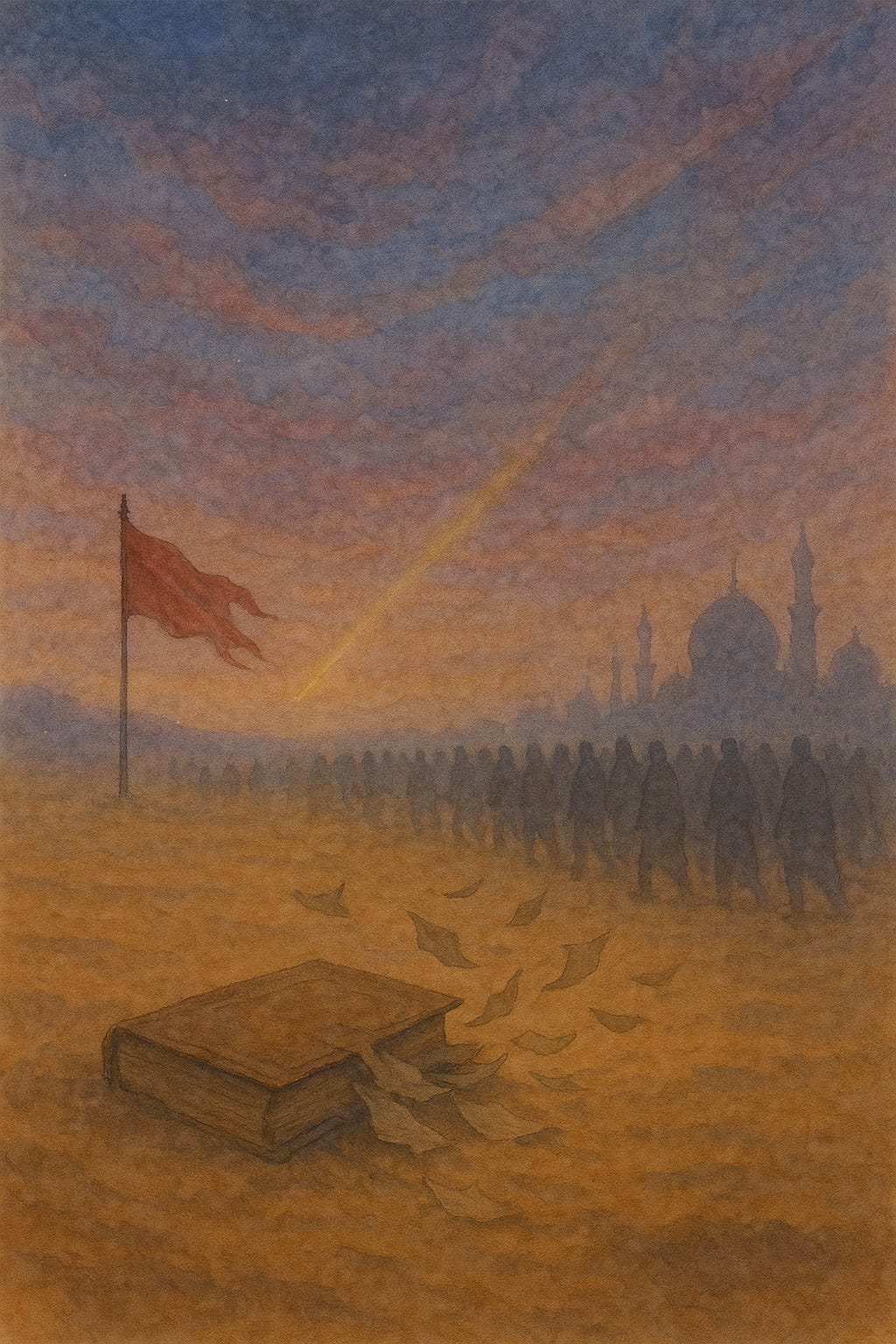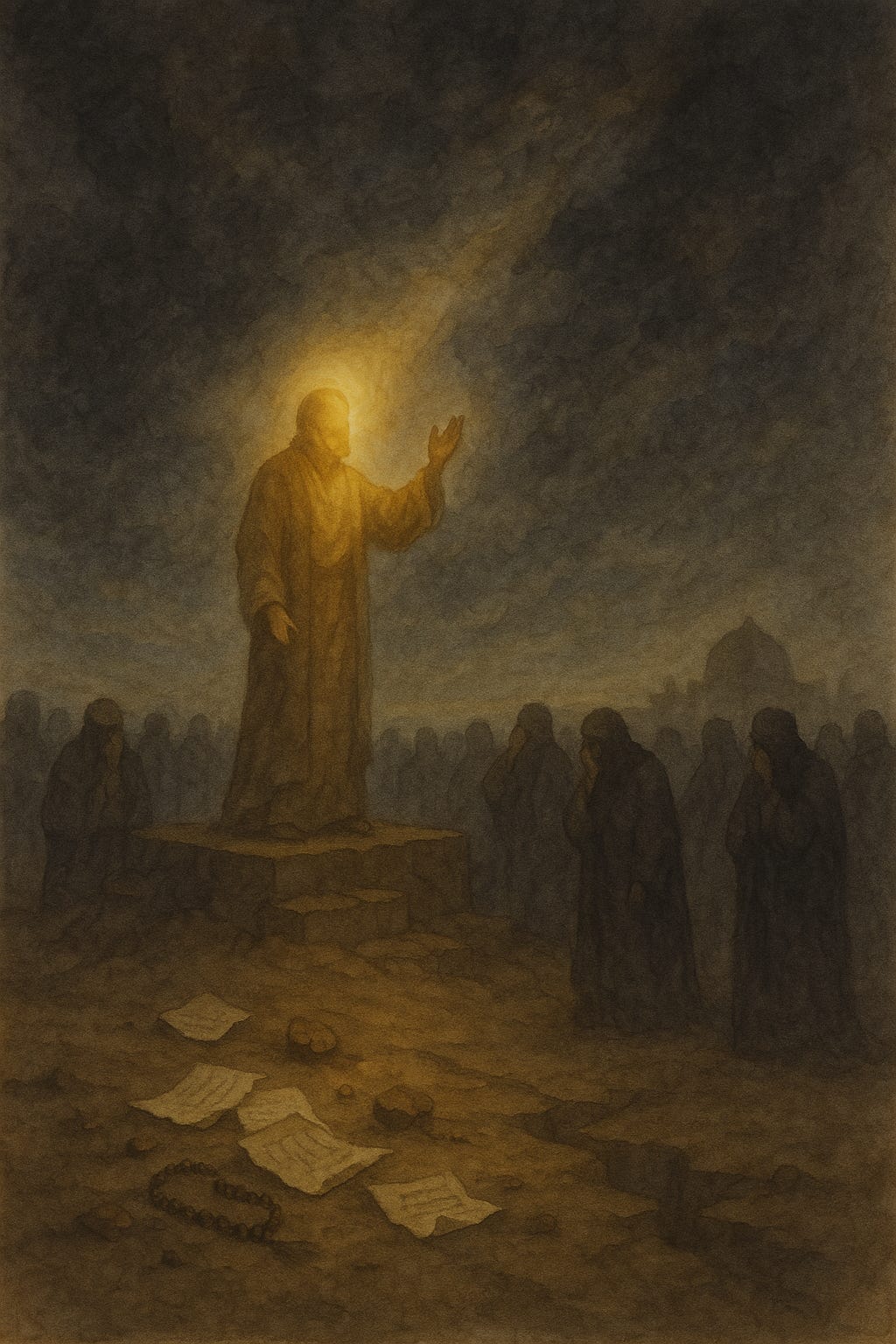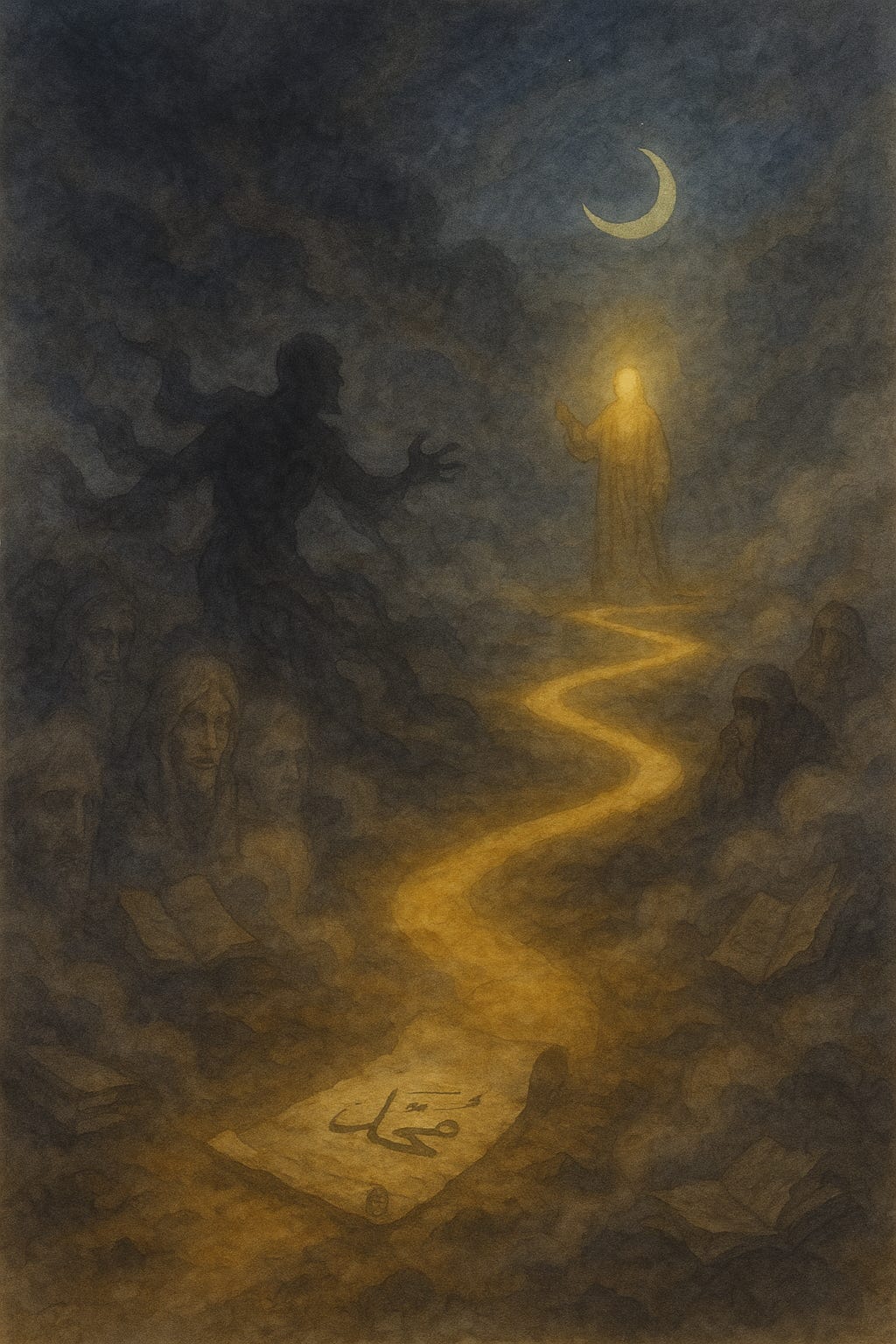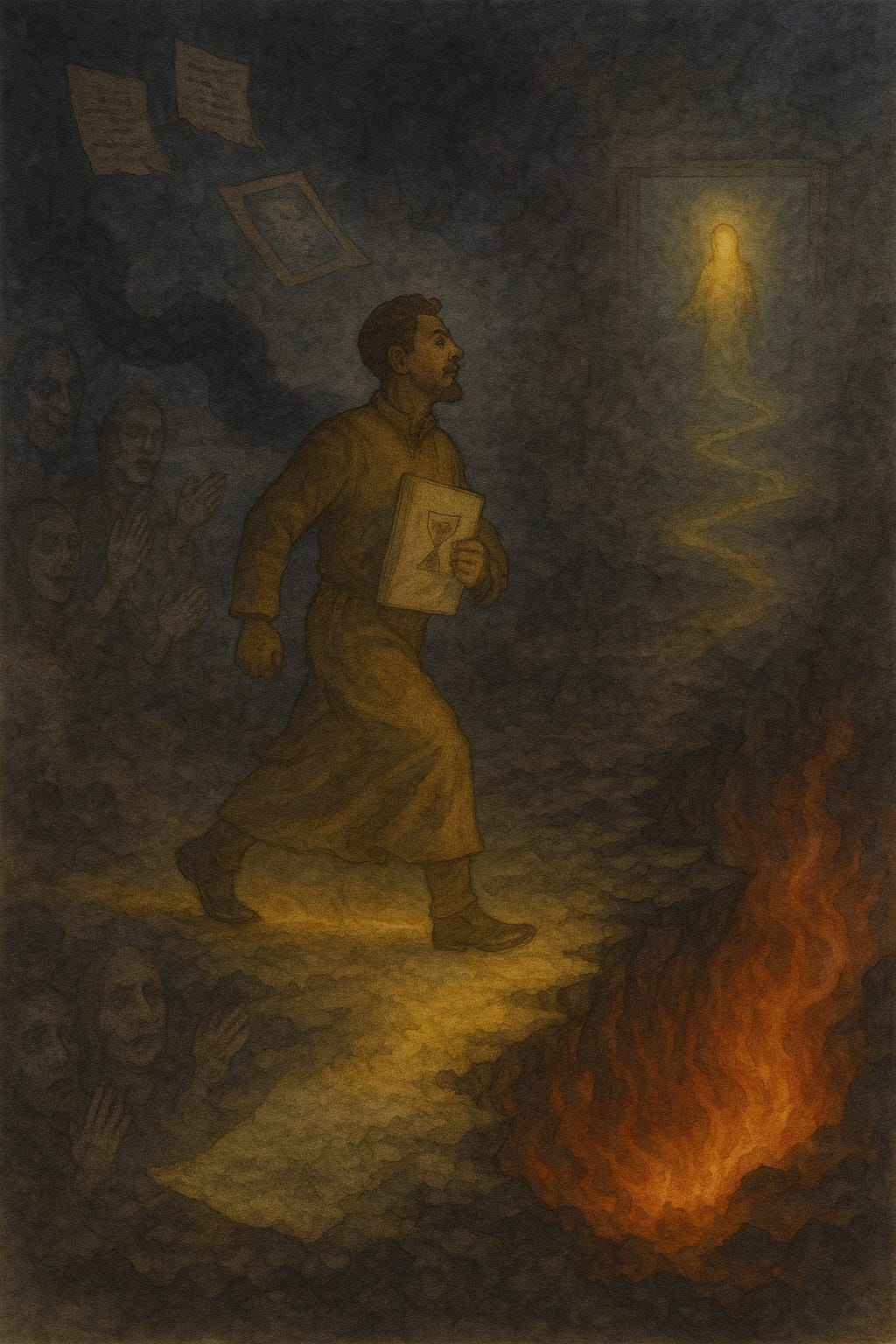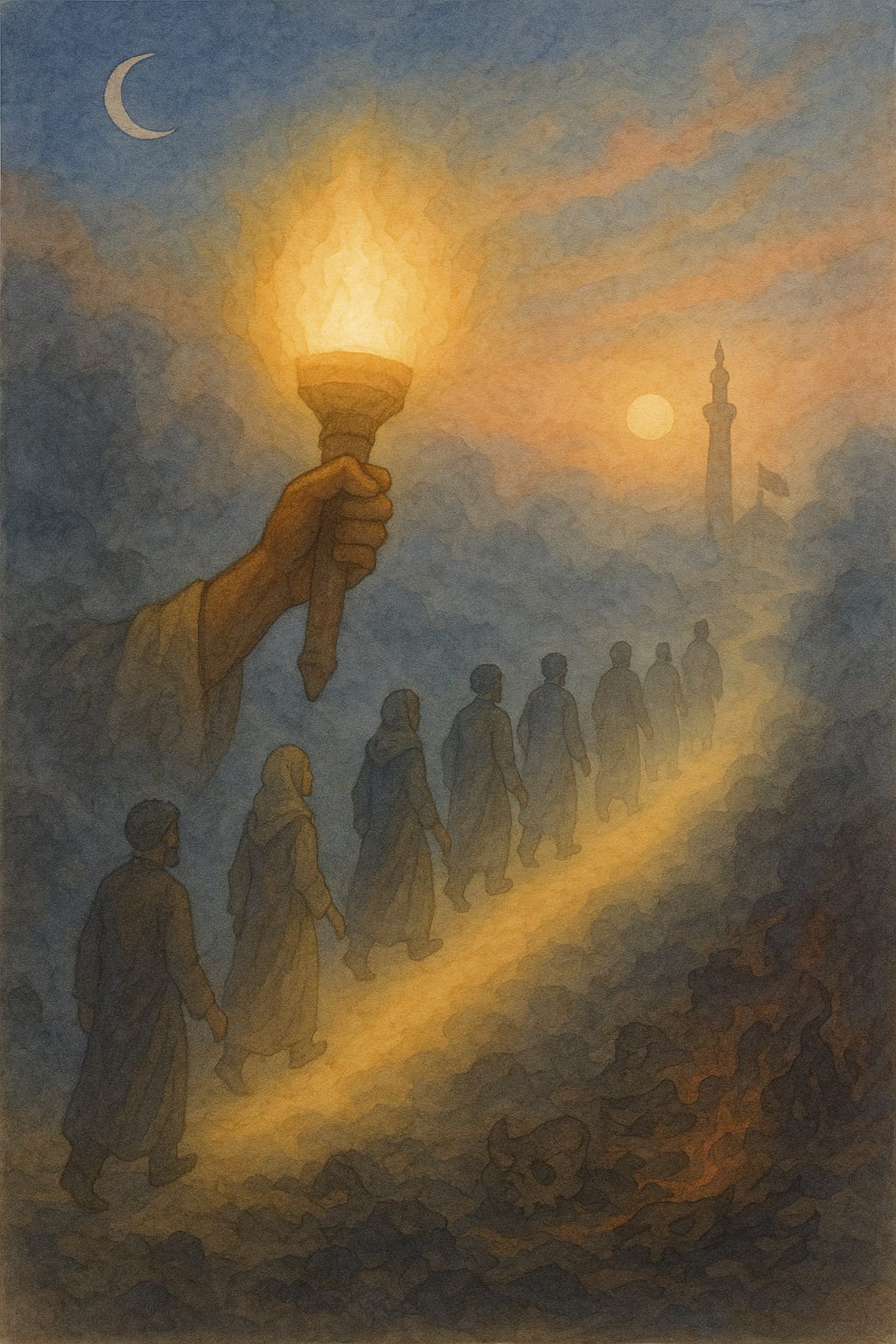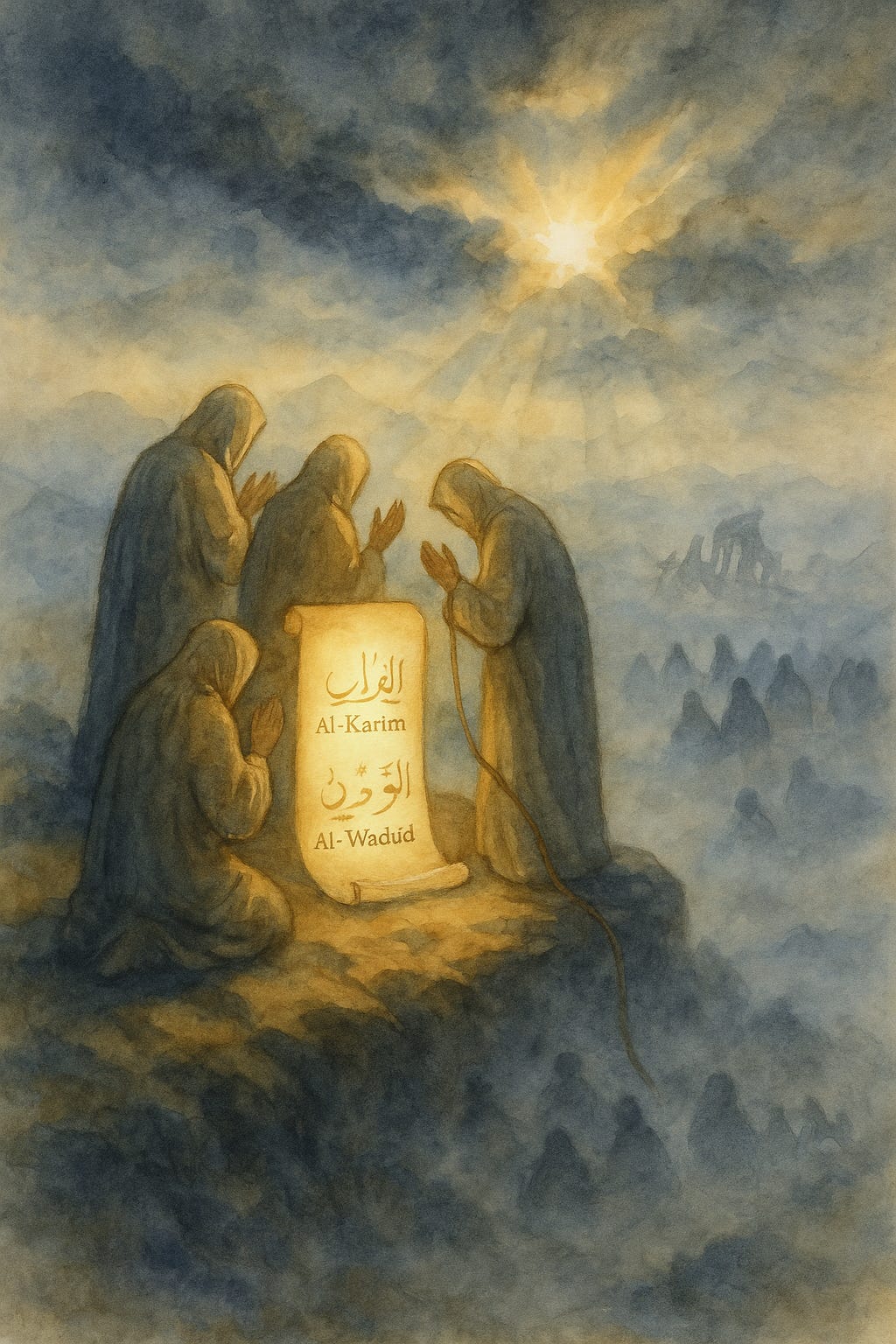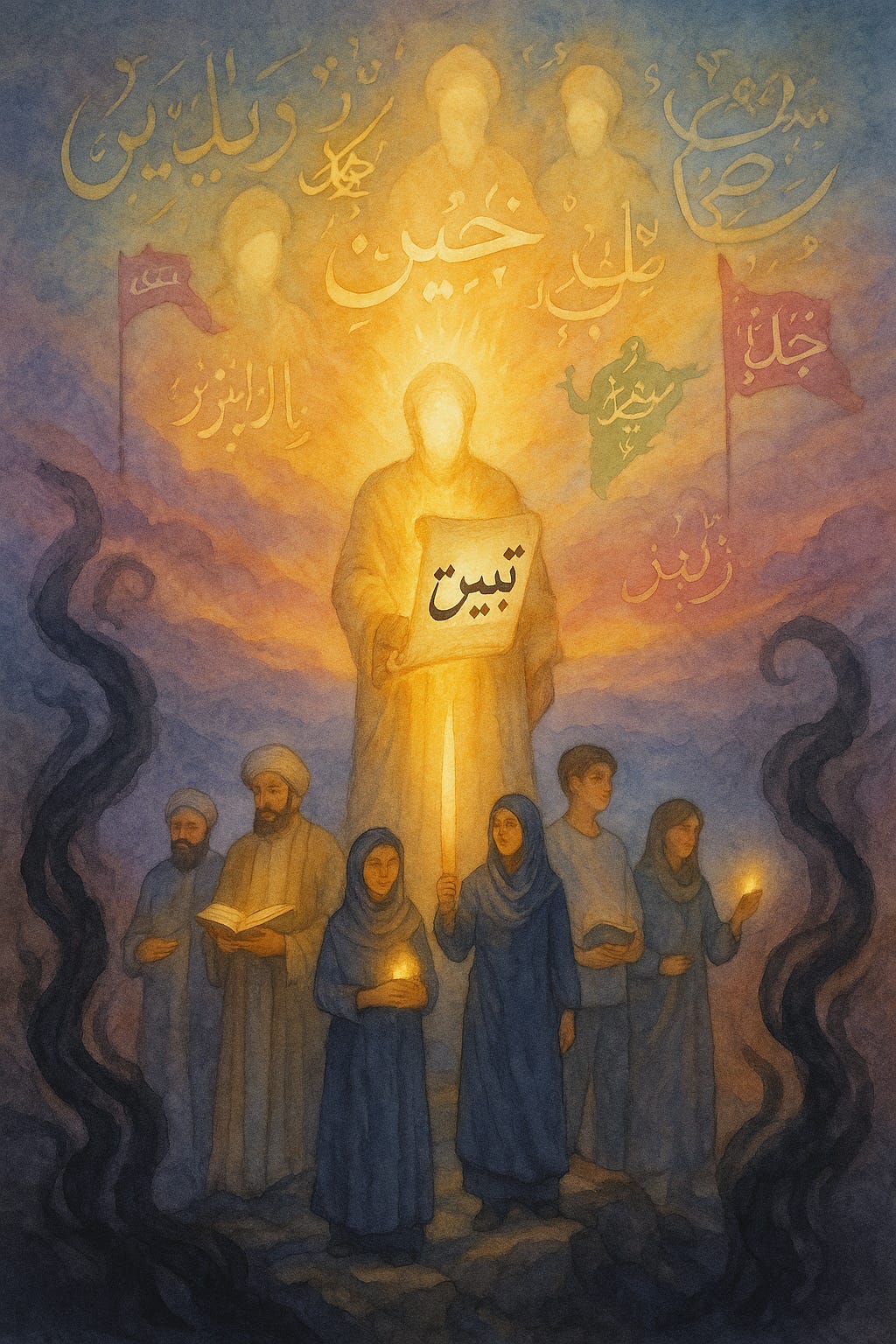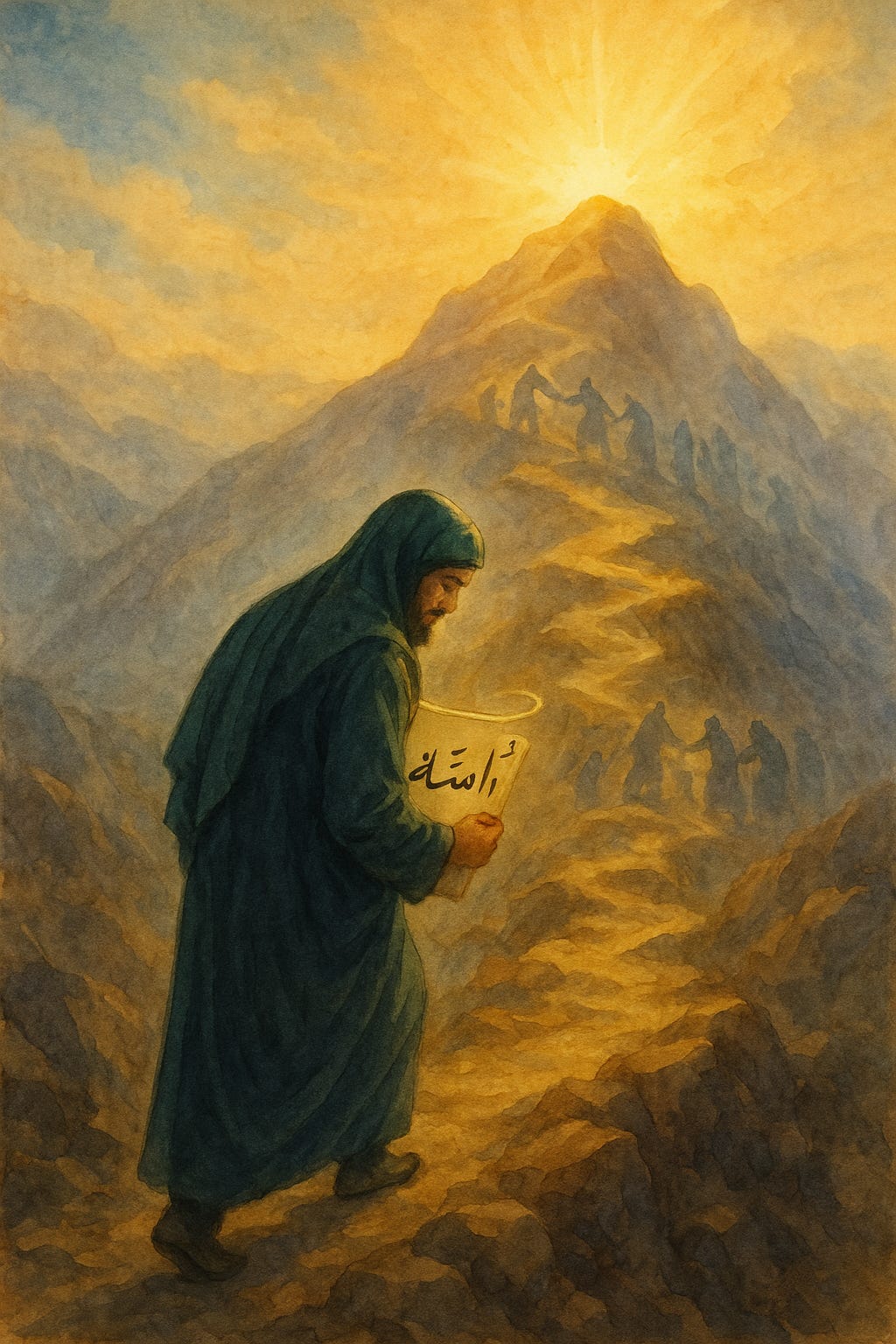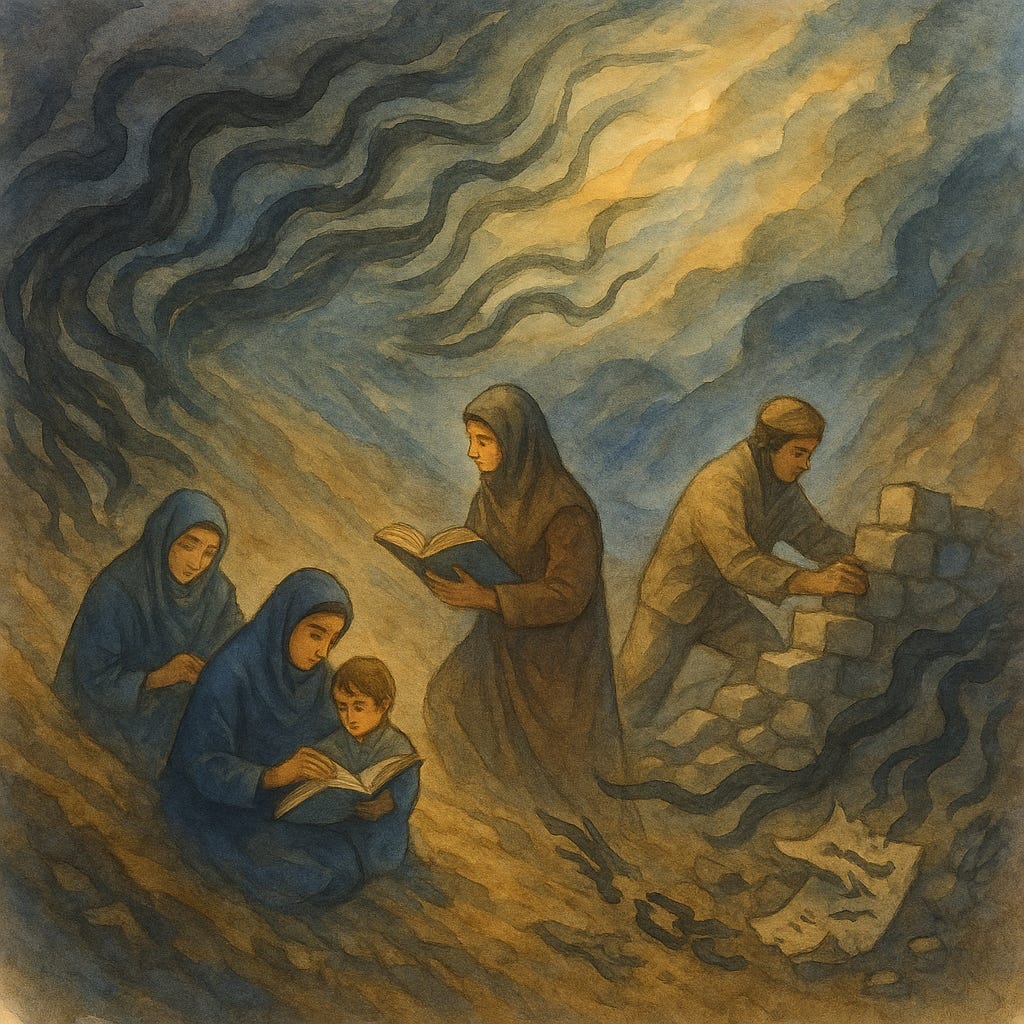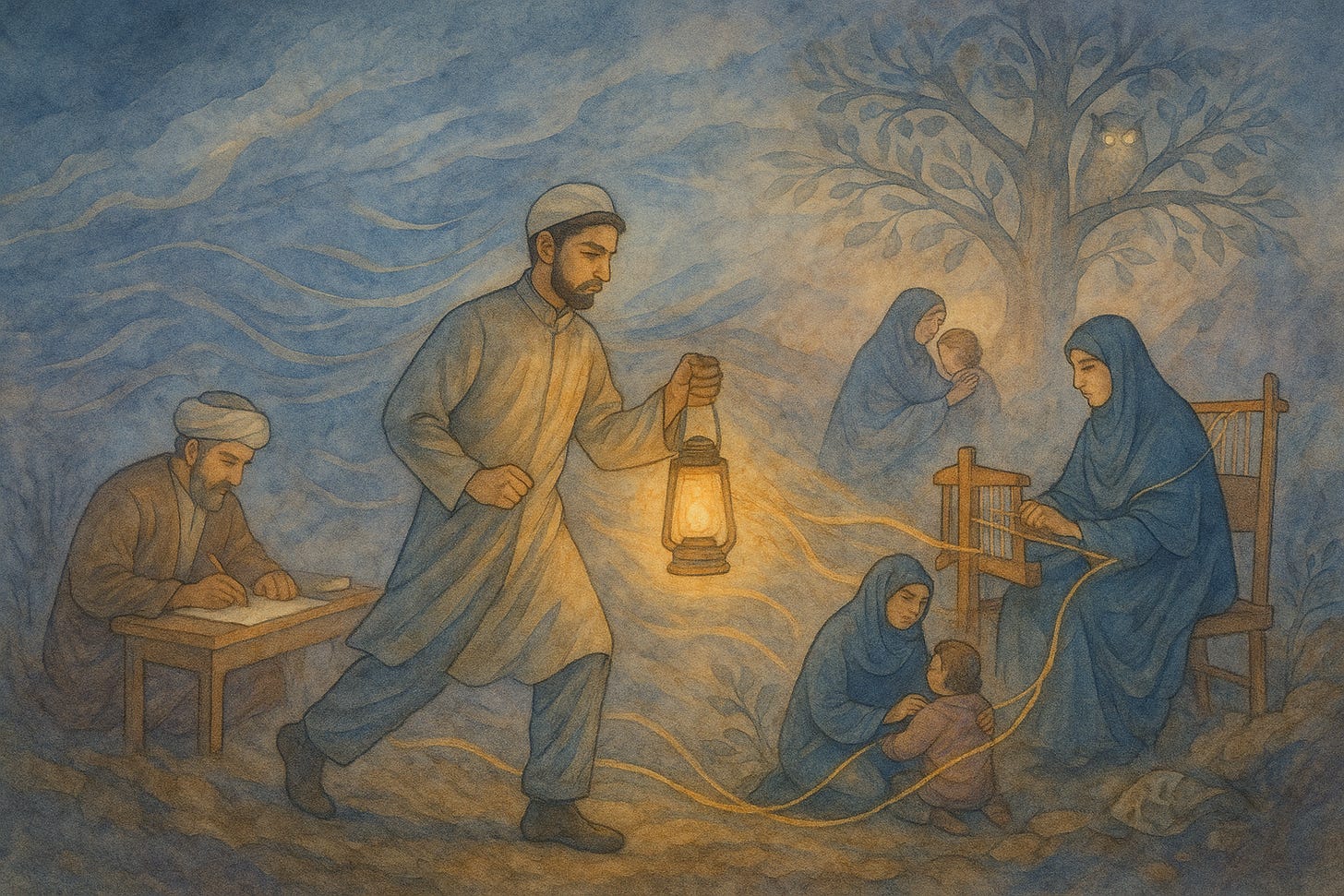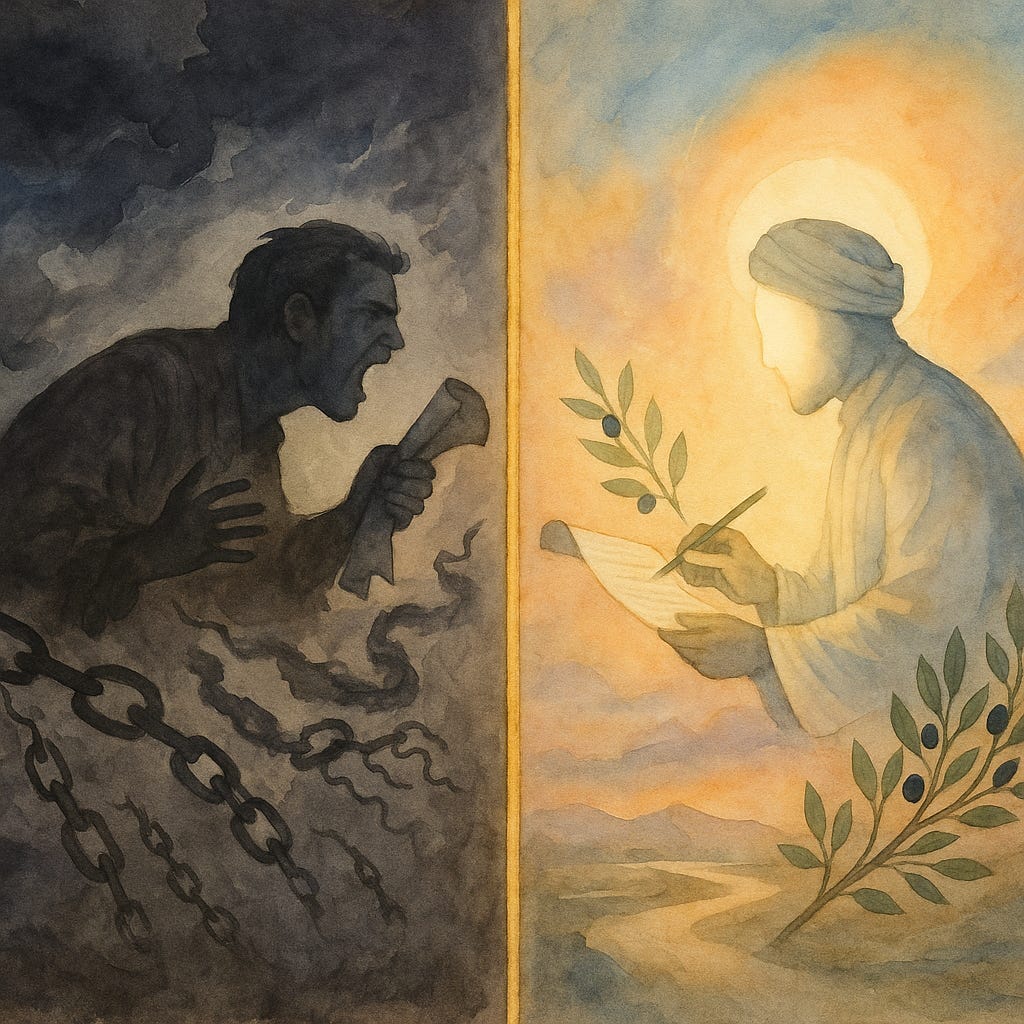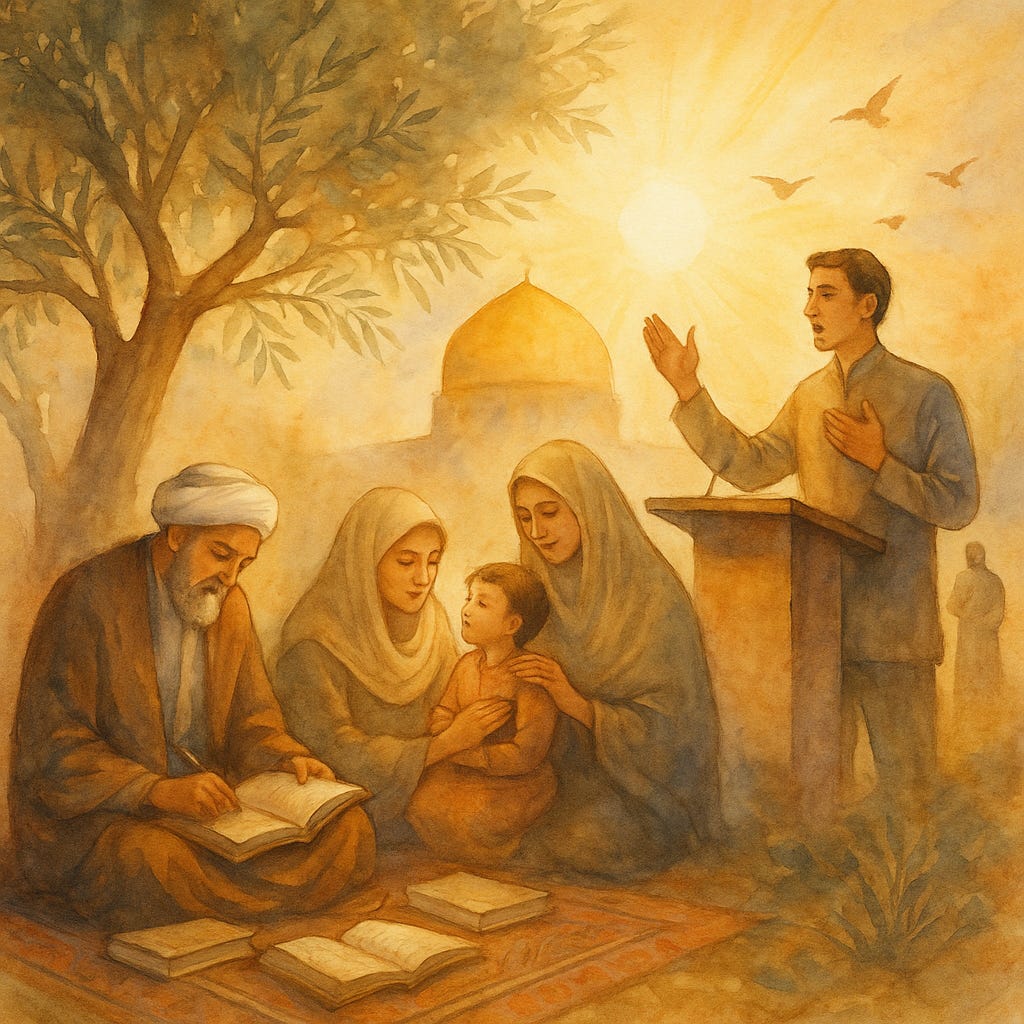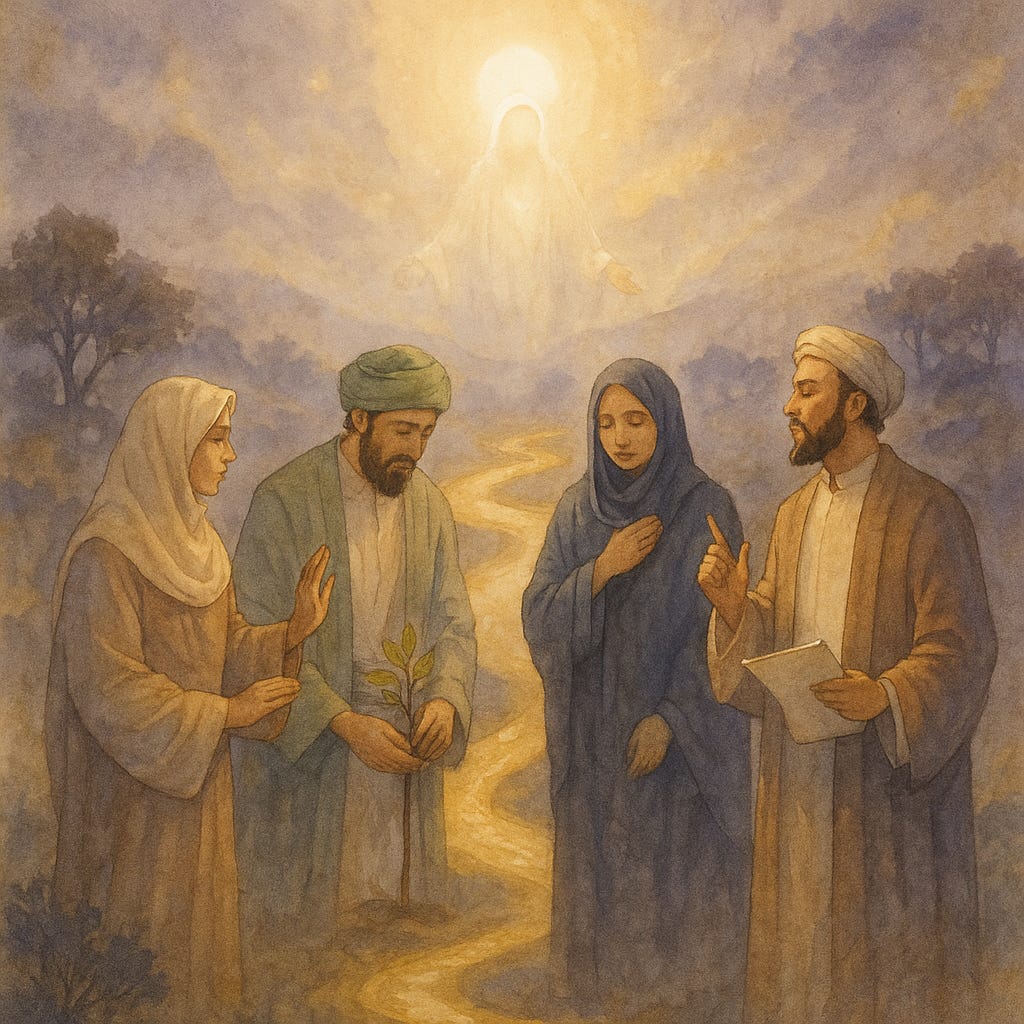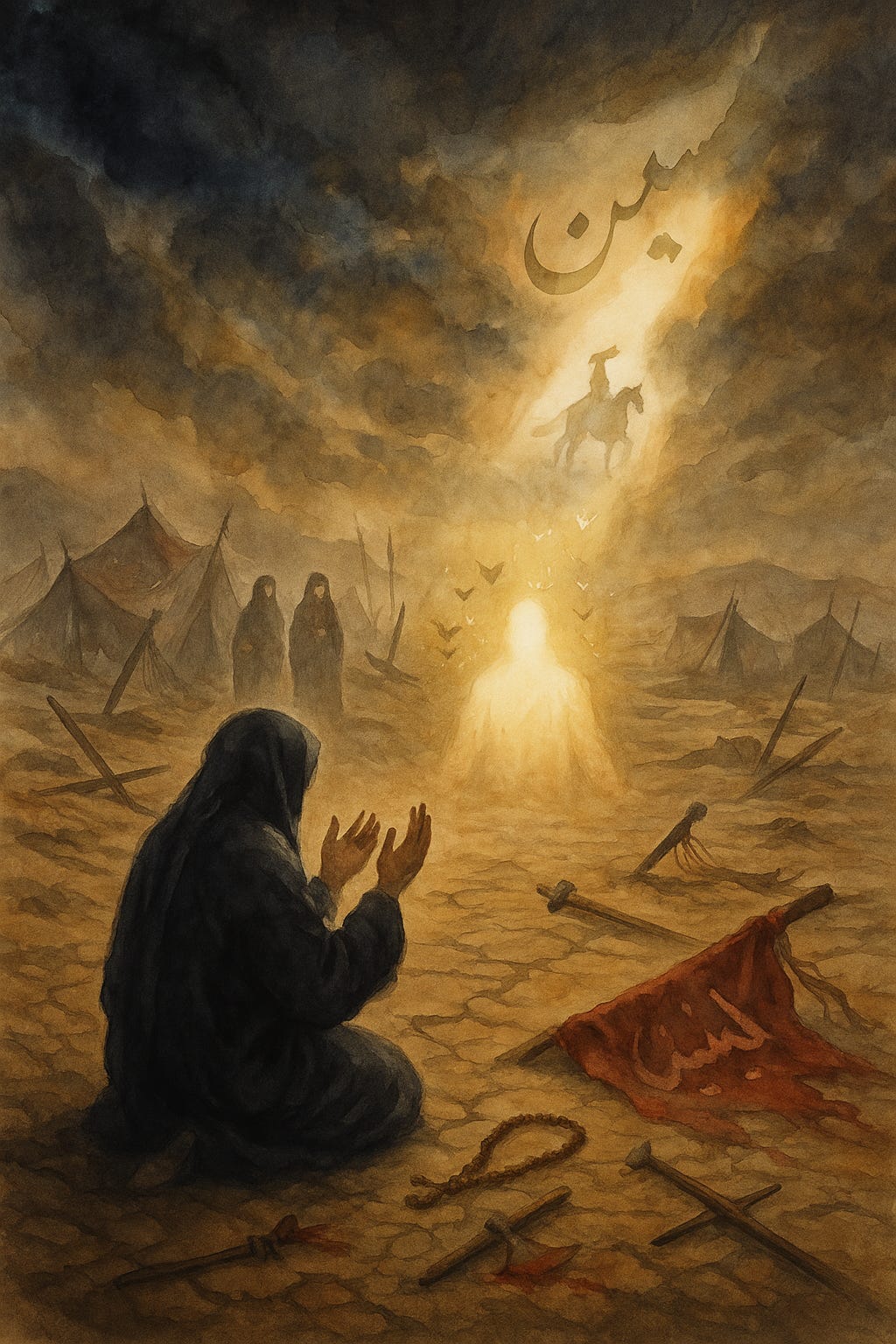[1] Tabyeen (Clarification) - Introduction
A series of discussions on the notion of clarification; critical within Islam and Islamic thought. This series is based on lectures delivered by Imam Khamenei. These sessions are for Ashura 2025/1447
In His Name, the Most High
اَلسَّلاَمُ عَلَيْكَ يَا أَبَا عَبْدِاللَّهِ
وَعَلَى الْأَرْوَاحِ الَّتِي حَلَّتْ بِفِنَائِكَ
عَلَيْكُمْ مِنَّا جَمِيعًا سَلاَمُ اللَّهِ أَبَدًا مَا بَقِينَا وَبَقِيَ اللَّيْلُ وَالنَّهَارُ
وَلا جَعَلَهُ اللَّهُ آخِرَ الْعَهْدِ مِنَّا لِزِيَارَتِكُمْ
اَلسَّلاَمُ عَلَى الْحُسَيْنِ
وَعَلَى عَلِيِّ بْنِ الْحُسَيْنِ
وَعَلَى أَوْلَادِ الْحُسَيْنِ
وَعَلَى أَصْحَابِ الْحُسَيْنِPeace be upon you, O Aba Abdillah (O Husayn),
and upon the souls who have gathered in your courtyard.
Upon you, from us all, is the peace of God—forever,
for as long as we remain and as long as night and day endure.
And may God never make this our last pledge to visit you.Peace be upon al-Husayn,
and upon Ali, son of al-Husayn,
and upon the children of al-Husayn,
and upon the companions of al-Husayn.—Adapted from Ziyarat Ashura1
Video of the Majlis (Sermon/Lecture)
Audio of the Majlis (Sermon/Lecture)
Introduction
With the month of Muharram upon us, and the first ten days being commemorated as the days of Ashura — wherein the epic tragedy of Karbala unfolded, where the grandson of the Prophet Muhammad (peace be upon him), along with his companions and family, were mercilessly martyred — it has been deemed important that we discuss a subject over the course of these ten days, and continue this during the ten days of Arbaeen (the commemoration of the fortieth day after the martyrdom of Imam Husayn).
The subject falls under the broader discussion of the causes that allowed the Muslim community, a mere fifty years after the passing of the Prophet Muhammad (peace be upon him), to become so confused, so lost, and so blinded by the lies of those seeking hegemony, that they were willing to massacre the very grandson of the Prophet.
The Status of Imam Hasan and Imam Husayn
The Prophet Muhammad (peace be upon him) loved Imam Hasan and Imam Husayn dearly. Both Sunni and Shia sources narrate that they are the two masters of the youth of Paradise.
From a Sunni source:
عَنْ وَائِلِ بْنِ حُجْرٍ، قَالَ: أَتَيْتُ النَّبِيَّ صَلَّى اللَّهُ عَلَيْهِ وَسَلَّمَ فِي صَحَابَتِهِ بِالْمَدِينَةِ، فَقَالَ: إِنَّ الْحَسَنَ وَالْحُسَيْنَ سَيِّدَا شَبَابِ أَهْلِ الْجَنَّةِ
Narrated by Wa’il ibn Hujr: “I came to the Prophet (peace be upon him) in Medina among his companions, and he said: ‘Indeed, Hasan and Husayn are the masters of the youth of Paradise.’”
—Al-Tirmidhi, Sunan2, Volume 5, Page 658, Hadeeth #3768
And from a Shia source:
وَرُوِيَ عَنِ النَّبِيِّ (ص) أَنَّهُ قَالَ: الْحَسَنُ وَالْحُسَيْنُ سَيِّدَا شَبَابِ أَهْلِ الْجَنَّةِ
It is narrated from the Prophet (peace be upon him) that he said: “Hasan and Husayn are the masters of the youth of Paradise.”
—Al-Majlisi, Bihar al-Anwar3, Volume 43, Page 263, Hadeeth #19
The Decline of the Muslim Community
How could a community, which professed love for the Prophet Muhammad (peace be upon him), and claimed to follow his teachings, turn so cruel and malicious that it would massacre his beloved grandson?
There are many contributing factors. However, the focus of this series will be on one primary cause: the failure to maintain a constant and clear clarification (tabyeen) of Islamic teachings and principles.
When leadership falls into the wrong hands, when rulers such as Yazid ibn Muawiyyah ascend, confusion and corruption follow. Yazid openly denied the very foundations of Islam. Both Sunni and Shia sources record his blasphemous statement:
From Sunni sources:
لَعِبَ آلُ هَاشِمٍ بِالمُلْكِ، فَمَا جَاءَ وَحْيٌ وَلاَ نَزَلَ كِتَابٌ
“The family of Hashim played with power (kingship); no revelation came, and no book was revealed!”
—At-Tabari, Tarikh al-Rusul wa al-Muluk4, Volume 5, Page 456 (Events of 61 AH)
—Ibn Kathir, Al-Bidayah wa al-Nihayah5, Volume 8, Page 224
And from Shia sources:
وَقَالَ يَزِيدُ لَعَنَهُ اللَّهُ: لَعِبَتْ هَاشِمٌ بِالْمُلْكِ فَمَا وَحْيٌ بَلَغَ وَلاَ كِتَابٌ نَزَلَ
And Yazid — may God curse him — said: “Hashim played with power; no revelation was conveyed, and no book was revealed!”
—Al-Majlisi, Bihar al-Anwar6, Volume 45, Page 132
The Failure of the Elites and Scholars
Worse still, many among the Muslim elite failed to oppose Yazid. Imam Husayn (peace be upon him) laments this reality in his famous sermon at Mina.
From Sunni sources:
يَا أَيُّهَا النَّاسُ! إِنَّ رَسُولَ اللَّهِ (ص) قَالَ: مَنْ رَأَى سُلْطَانًا جَائِرًا مُسْتَحِلًّا لِحُرُمِ اللَّهِ، نَاكِثًا لِعَهْدِ اللَّهِ، مُخَالِفًا لِسُنَّةِ رَسُولِ اللَّهِ، يَعْمَلُ فِي عِبَادِ اللَّهِ بِالْإِثْمِ وَالْعُدْوَانِ، فَلَمْ يُغَيِّرْ عَلَيْهِ بِفِعْلٍ وَلَا قَوْلٍ، كَانَ حَقًّا عَلَى اللَّهِ أَنْ يُدْخِلَهُ مَدْخَلَهُ… أَلَا وَإِنَّ هَؤُلَاءِ قَدْ لَزِمُوا طَاعَةَ الشَّيْطَانِ
“O people! The Messenger of God said: ‘Whoever sees a tyrannical ruler who violates the sanctities of God, breaks His covenant, opposes the Sunnah of the Messenger of God, and acts with sin and aggression against God’s servants — yet does not oppose him by word or deed — then God has the right to cast him into the ruler’s fate… Indeed, these people have adhered to the obedience of Satan.’”
—At-Tabari, Tarikh al-Rusul wa al-Muluk7, Volume 4, Page 304 (Events of 60 AH)
In another source from Sunni sources:
فَإِنَّ هَؤُلَاءِ قَدْ لَزِمُوا طَاعَةَ الشَّيْطَانِ، وَتَرَكُوا طَاعَةَ الرَّحْمَنِ، وَأَظْهَرُوا الْفَسَادَ، وَعَطَّلُوا الْحُدُودَ، وَاسْتَأْثَرُوا بِالْفَيْءِ، وَأَحَلُّوا حَرَامَ اللَّهِ، وَحَرَّمُوا حَلَالَهُ… وَإِنِّي أَحَقُّ بِهَذَا الْأَمْرِ مِنْ هَذَا الْغَاصِبِ الظَّالِمِ… فَأَيْنَ الْمُتَّقُونَ؟ أَيْنَ الْمُنْصِفُونَ؟ أَيْنَ الْمُسْتَقِيمُونَ؟ أَيْنَ الْمُؤْمِنُونَ؟!
“These people have adhered to the obedience of Satan and abandoned the obedience of the Merciful. They have spread corruption, suspended divine laws, monopolised public wealth, made lawful what God has forbidden, and forbidden what God has made lawful… And I am more deserving of this authority than this oppressive usurper… Where are the God-fearing? Where are the just? Where are the upright? Where are the believers?!”
—Ibn Kathir, Al-Bidayah wa al-Nihayah8, Volume 8, Page 158
—Ibn Asakir, Tarikh Madinat Dimashq9, Biography of Imam Husayn, Volume 14, Page 225
And from Shia sources:
أَيُّهَا النَّاسُ! إِنَّ اللَّهَ أَمَرَ بِالْأَمْرِ بِالْمَعْرُوفِ وَالنَّهْيِ عَنِ الْمُنْكَرِ، فَإِنَّكُمْ إِنْ أَطَعْتُمُ أَهْلَ الْجَوْرِ، كُنْتُمْ كَمَا قَالَ اللَّهُ: {لُعِنَ الَّذِينَ كَفَرُوا مِنْ بَنِي إِسْرَائِيلَ عَلَى لِسَانِ دَاوُدَ وَعِيسَى ابْنِ مَرْيَمَ}… فَأَيْنَ الْمُتَّقُونَ؟ أَيْنَ الْمُنْصِفُونَ؟!
“O people! God has commanded enjoining good and forbidding evil. If you obey the unjust rulers, you will be like those whom God cursed among the Children of Israel by the tongue of David and Jesus, son of Mary… Where are the God-fearing? Where are the just?!”
—Al-Majlisi, Bihar al-Anwar10, Volume 44, Page 382
Satan’s Plot and the Role of Scholars
When the elites and scholars abandon their duty of clarification, the truth becomes orphaned. Lies and corruption fill the void, fulfilling Satan’s ancient vow:
قَالَ فَبِمَا أَغْوَيْتَنِي لَأَقْعُدَنَّ لَهُمْ صِرَاطَكَ الْمُسْتَقِيمَثُمَّ لَآتِيَنَّهُم مِّن بَيْنِ أَيْدِيهِمْ وَمِنْ خَلْفِهِمْ وَعَنْ أَيْمَانِهِمْ وَعَن شَمَائِلِهِمْ ۖ وَلَا تَجِدُ أَكْثَرَهُمْ شَاكِرِينَ
‘As You have consigned me to perversity,’ he (Satan) said, ‘I will surely lie in wait for them on Your straight path. Then I will come at them from their front and from their rear, and from their right and their left, and You will not find most of them to be grateful.’
—Quran, Surah al-A’raaf (the Chapter of the Heights) #7, Verses #16 to #17
Ignorance spreads when scholars restrict themselves to praising the Prophet Muhammad and his family superficially, without teaching the necessary lessons to walk upon his path. The Prophet was sent as the best exemplar:
لَّقَدْ كَانَ لَكُمْ فِي رَسُولِ اللَّهِ أُسْوَةٌ حَسَنَةٌ لِّمَن كَانَ يَرْجُو اللَّهَ وَالْيَوْمَ الْآخِرَ وَذَكَرَ اللَّهَ كَثِيرًا
You have an excellent example in the Messenger of God; for anyone who seeks God and the Last Day, and remembers God frequently.
—Quran, Surah al-Ahzaab (the Chapter of the Confederates) #33, Verse #21
The Danger of Self-Delusion
The Quran warns against those who are deluded into thinking they are doing good while actually being misguided:
قُلْ هَلْ نُنَبِّئُكُم بِالْأَخْسَرِينَ أَعْمَالًا
الَّذِينَ ضَلَّ سَعْيُهُمْ فِي الْحَيَاةِ الدُّنْيَا وَهُمْ يَحْسَبُونَ أَنَّهُمْ يُحْسِنُونَ صُنْعًا
أُولَٰئِكَ الَّذِينَ كَفَرُوا بِآيَاتِ رَبِّهِمْ وَلِقَائِهِ فَحَبِطَتْ أَعْمَالُهُمْ فَلَا نُقِيمُ لَهُمْ يَوْمَ الْقِيَامَةِ وَزْنًا
ذَٰلِكَ جَزَاؤُهُمْ جَهَنَّمُ بِمَا كَفَرُوا وَاتَّخَذُوا آيَاتِي وَرُسُلِي هُزُوًاSay, ‘Shall we inform you about the biggest losers in regard to works?
Those whose endeavour goes awry in the life of the world, while they suppose they are doing good.
They are the ones who deny the signs of their Lord and the encounter with Him. So their works have failed, and on the Day of Resurrection We shall not assign any weight to them.
That is their requital—hell, for what they defied [God] and took My signs and My apostles in derision.’—Quran, Surah al-Kahf (the Chapter of the Cave) #18, Verses #103 to #106
The Path Forward: Tabyeen (Clarification)
The only remedy is for the scholars, elites, and the people to struggle resolutely in the path of tabyeen — clarification — ensuring that Islam is understood clearly, and that the lies of the enemies of humanity never take root.
For this year’s commemoration of Muharram and Arbaeen, our discussion will centre on this vital theme of tabyeen. We will use the excellent lectures of Imam Khamenei and other reliable teachings as our baseline resources.
A Prayer for Success
We ask God — the Most Generous, the Most Loving — to grant us tawfeeq (success, ability) in this important task: to dispel misinformation spread by both the criminal media and, more tragically, by the negligent and corrupted elites and scholars within the Muslim community.
As history has shown, the corruption of understanding led people to deny even the most obvious truths, such as when they questioned whether Imam Ali (peace be upon him) ever prayed after hearing of his martyrdom.
From Sunni sources:
وَلَمَّا جَاءَهُمْ خَبَرُ مَقْتَلِ عَلِيٍّ رَضِيَ اللَّهُ عَنْهُ، قَالَ بَعْضُهُمْ: “وَاللَّهِ مَا كَانَ يُصَلِّي!”
“When the news of Ali’s killing reached them, some said: ‘By God, he never even prayed!’”
—Ibn Abi al-Hadid, Sharh Nahjul Balagha11, Volume 4, Page 56
—Ibn Kathir, Al-Bidayah wa al-Nihayah12, Volume 7, Page 324
And from Shia sources:
فَلَمَّا قُتِلَ أَمِيرُ الْمُؤْمِنِينَ عَلِيُّ بْنُ أَبِي طَالِبٍ (ع) بَلَغَ الْخَبَرُ أَهْلَ الشَّامِ، فَقَالَ بَعْضُهُمْ: “وَاللَّهِ مَا صَلَّى قَطُّ!”
“When the news of Imam Ali’s martyrdom reached the people of Syria, some said: ‘By God, he never prayed!’”
—Al-Majlisi, Bihar al-Anwar13, Volume 42, Page 268
Let us embark on this journey with sincerity, trust in God, and a firm hold on His covenant, hoping to be among the guided and the successful.
Tabyeen (Clarification) - An Introduction
All Islamic nations, and indeed the entire Ummah, bear a sacred duty in the ongoing struggle for clarification.
This is the foremost priority.
Religious scholars, intellectuals, the educated, and those who possess a pulpit or platform must strive to present the realities of the Islamic world to the people.
This act of clarification is itself a form of jihad (struggle).
Jihad is not confined to the battlefield.
It encompasses:
Intellectual jihad,
Practical jihad,
The jihad of elucidation
The jihad of propagation, and
The jihad of wealth.
The failure, at times, to fulfil the jihad of clarification has led many to fall into misguidance and confusion.
It is essential that all who are able give serious importance to the duty of clarification. Many truths remain obscured and urgently require elucidation.
A powerful movement of misguidance, advancing from countless directions, seeks to influence public opinion and sow doubt in the hearts of believers. It stands among the chief objectives of the enemies of Islam and the Islamic awakening.
This movement aims to cloud minds in doubt and disconnect intellects from truth. In the face of such efforts, the movement of clarification becomes the essential antidote to conspiracy and falsehood.
It is a responsibility upon each individual to become like a beacon, illuminating the surroundings with clarity and truth.
Thankfully, today, the public arena is open to the spread of ideas. While challenges and obstacles exist, this openness also brings with it tremendous blessings. It offers the opportunity to spread correct understandings and respond to the criticisms and doubts that are deliberately manufactured.
This is a true arena of jihad, in its deepest and most comprehensive sense.
Yet, a firm principle must govern this engagement: the use of ethical means.
Some address public opinion — whether on social media, in the press, or through writings — with insults, slander, deception, and lies.
This must be avoided at all costs.
Truth must be presented with sound logic and eloquent speech, built upon rigorous intellectual foundations.
Moreover, this intellectual effort must be adorned with compassion, sincerity, and an unwavering commitment to ethics.
Each individual, within his or her sphere and capacity, can and must act in this arena.
By the will of God, the Almighty, success awaits those who rise to this task.
Praise be to God, there is today no shortage of those who are intellectually and logically equipped, and who possess a wealth of knowledge necessary to labour in this field.
One must continue to prepare, expand one’s capacities, and arm oneself properly to enter this battlefield of clarification and exposition — the very path once taken by Sayyedah Zaynab al-Kubra.
The burden of protecting this divine trust — the trust of the Prophets — rests upon the shoulders of the believing community.
It is a sacred inheritance passed down from the great divine Prophets.
It represents the aspiration of Musa (Moses), Isa (Jesus), the Awliya (God’s representatives), and the Aimmah (Imams) — a vision now partially realised — and, if God wills, it will reach its completion during the greater governance and lofty authority of the Twelfth Imam, may our souls be sacrificed for the dust beneath his feet.
This is a weighty and priceless trust. It must be protected.
The Struggle
To live is to struggle in pursuit of a meaningful objective. A society established upon new values and lofty goals is, by its nature, revolutionary.
What does it mean to bring about a revolution, if not to usher in something new — to replace hollow patterns with purposeful direction?
A truly transformed society must be rooted in values, and from those values, its objectives arise. It is these objectives that give shape to the path ahead. And life, in essence, is the effort exerted to walk that path.
Hence the phrase:
Indeed, life is belief and struggle (jihad).14
Jihad is not confined to the battlefield or the clash of swords and weapons.
Every sincere effort made toward noble goals is a form of jihad.
To live meaningfully is to identify one’s values, clarify one’s objectives, and then expend all one’s strength to achieve them.
Life devoid of values is no life at all — it is mere existence, a stagnation of the soul. Without such a foundation, a person may grow and accumulate, strive and acquire — yet remain no more than a body in motion, living an animalistic life.
This, surely, is not the life of a human being.
This truth is not confined to a particular land, doctrine, or political system. It is a universal principle.
Wherever sound reason exists, this understanding of life and struggle emerges.
Those who live with purpose set their sights on an ideal and strive with love and sincerity to attain it.
The more arduous the path and the greater the sacrifice, the more profound the joy upon its fulfilment.
Just as a person feels a deep satisfaction after a strenuous workout, or the fulfilment of a well-executed plan, so too is there a contentment born from sincere, voluntary effort.
From this we understand a universal principle: the more intense the labour, the more difficult the task, the greater the satisfaction at its completion.
This truth is not bound by region — East or West — it is evident wherever humans live and strive.
That said, we each live within a particular moment and context. We inhabit a society shaped by values that point toward high aims.
These values are not possessions to be handed out, taken, or altered at will. They are a sacred trust. One cannot gift another from the pouch of divine stewardship, nor receive from it as a personal favour.
These are not individual entitlements, but shared responsibilities rooted in spiritual and moral obligations.
The Meaning and Scope of Jihad
Jihad is a vast, encompassing, and enduring reality.
It is not defined solely by the sword or the battlefield.
In Islamic jurisprudence, the measure of jihad lies not in weaponry but in struggle.
The contemporary term that best captures its essence is simply: to strive.
One may be a writer, a scholar, or a teacher who engages in jihad — and one may also refrain from it.
An institution, a community, or a people may rise to the call of jihad — or fall into passivity.
Jihad is the decision to engage in the struggle.
A true movement aims to show, by example, that the Islamic ideal is not a dream but a living reality. It has always been one of the core objectives of the Islamic awakening to bear witness to this truth — to say, with presence and action: It is possible.
However, achieving such goals is not without obstacles.
Had we faced no resistance or barriers, it would not have taken long for our collective aims to be realised.
Yet in truth, it is the presence of these very obstacles that gives meaning to our effort, and spiritual substance to our striving. This is what we call jihad.
Without opposition, struggle is meaningless.
Jihad is the act of striving through hardship, trial, and resistance.
The Conditions and Qualities of Jihad
Not every action qualifies as jihad. For an act to be counted as such, it must possess certain attributes.
The first is that it must be performed in the face of opposition — an act that resists forces driven by enmity and ill-intent. One of the defining conditions of jihad is that it confronts a hostile agenda, one set against truth and justice.
The second set of attributes includes: continuity, wisdom, and sincerity.
Jihad is not impulsive; it is purposeful and enduring.
For example, economic jihad refers to sustained, intelligent, and comprehensive effort against a hostile and scheming enemy.
The battlefield is not the only arena of jihad.
In the realm of knowledge, as in every other domain of life, jihad is required. It means tireless effort — embracing difficulty wisely and advancing with hope.
The Foundations of Jihad
There are two foundational pillars of jihad:
Effort and action — one cannot engage in jihad while idle or withdrawn.
The presence of an enemy — a struggle without opposition is not jihad.
When effort is misdirected against one’s own allies or just leadership, it is not jihad; it becomes sedition.
To turn against truth in the name of struggle is to commit spiritual and social betrayal.
Words, writings, rumour-mongering, slander, and demoralisation — when used to harm the believers or disrupt just order — fall into the realm of mischief (fitnah) and, in some cases, unlawful rebellion.
However, when these same tools are turned against the enemies of God, they become noble instruments of jihad.
The Messenger of God called us to this noble struggle — not to apathy or withdrawal, but to steadfast effort and conscious striving.
The Diverse Arenas of Jihad
Jihad is the effort to attain a divine and lofty aim.
It takes place in many forms: on the battlefield, in the political arena, in education, in culture, and in the depths of the soul.
For an action to be considered jihad, it must be intentional, face resistance, and demand elevated effort.
This is jihad — and when the intention behind it is divine, it becomes holy.
The pursuit of knowledge is a form of jihad, for there are real and determined enemies who wish to halt the advancement of an independent, informed, and spiritually grounded society.
This struggle is not confined to academic institutions — it is a cultural mission, a purposeful movement.
The more we establish and strengthen this culture of principled striving, the more we elevate our collective dignity, honour, and independence.
The Branches of Jihad
The Commander of the Faithful, Imam Ali, identified the four branches of jihad:
“Enjoining good, forbidding evil, speaking the truth, and being honest in your stances.”15
This sincerity in one’s public, political, and social positions is also a form of jihad.
The Quran describes another facet of jihad:
مِنَ الْمُؤْمِنِينَ رِجَالٌ صَدَقُوا مَا عَاهَدُوا اللَّهَ عَلَيْهِ فَمِنْهُم مَّن قَضَىٰ نَحْبَهُ وَمِنْهُم مَّن يَنتَظِرُ وَمَا بَدَّلُوا تَبْدِيلًا
Among the believers are men who have been true to their covenant with God; some of them have fulfilled their vow [to the death], and some are still waiting, but they have never changed [their determination] in the least.
—Quran, Surah al-Ahzaab (the Chapter of the Confederates) #33, Verse #23
Another branch of jihad is Shina’an al-Fasiqeen — separating oneself from the movements of corruption and disbelief.
Boundaries between truth and falsehood must be made clear.
While interaction and cooperation across lines of belief may occur, the distinction must never be blurred. When these lines are erased, spiritual confusion takes hold, and individuals cross from one side to the other without realising it.
A society without clear moral borders cannot preserve its identity.
As Imam Ali also said:
“Whoever detests the vicious and becomes angry for the sake of God, then God will be angry for his sake, and will keep him pleased on the Day of Judgement.”16
Conclusion
Jihad and effort share a common root — they both imply struggle. But jihad is not simply toil; it is struggle with purpose, resistance, and direction.
It manifests in many forms: educational, journalistic, political, economic, and military. It may be overt or subtle, but its constant is this: jihad is always directed against opposition.
There is no jihad against friends or allies — only against those who oppose divine truth.
Even under oppressive regimes or stifling environments, efforts only become jihad when they serve the cause of resistance to tyranny.
A person reading five books a week during a dark period does not necessarily engage in jihad. But if those books strengthen one’s stance against injustice, then such reading becomes a noble struggle.
In our time, the arenas of jihad lie in the domains of knowledge, skills, and ethical resistance. We do not require swords and spears here. The pen, the mind, the heart, and the voice are our weapons.
Through them we strive. Through them we honour the call of jihad.
Supplication-Eulogy: #1: “Where Is Husayn?”
First Night – “Where Is Husayn?”
In His Name, the Lord of the Martyrs and the Truthful
O God, Send your blessings upon Muhammad and the Family of Muhammad
O my Lord… O the One who sees the tears of the brokenhearted…
Where is the sound of his voice that once called,
“Is there anyone to help me?”
Yet none remained but the silence of the desert,
and the trembling of women in tents set ablaze.Where is my Husayn?
O God…
You who placed love for him in our chests,
and grief for him in our ribs like a sword never sheathed —
Where is the fragrance of Tayyabah?
Where is the remnant of Your Prophet, slain upon the soil of Karbala?We were not there on that day.
We did not answer his call.
We were not among those who fell for him.Oh, how I wish I had been with you, so I too could have triumphed with you!
O son of the Prophet…
O Aba Abdillah, O the son of Fatimah
Your neck was severed while thirsty,
Your head raised to the lances of tyrants,
And we remained in the lands of ease —
eating, sleeping, praying, living,
as if you had not been torn to pieces.O God!
The skies wept blood for him.
The stones turned red.
Even the angels cried until the Throne trembled!And yet — this world continues…
The oppressors prosper.
The tyrants live.
Your Hujjah remains veiled…
And our tears fall into the dust of our failure.O my Master, O the Hidden One… O son of Hasan, O inheritor of Husayn!
Is there a path to you, O son of Ahmad, so we may reach you?
Will you not emerge,
with the banner of vengeance unfurled,
to cry the cry of Ya Litharat al-Husayn?
To avenge the blood spilled, the neck severed,
the children trampled?Your grandfather lies on the plains of Karbala,
unburied, unloved by this world,
except by a scattered few who still weep through the nights.
And we — O Master — are they.O God…
Make this grief our light.
Let our tears be swords in Your cause.
Let this mourning cleanse us of hypocrisy,
And awaken in us the courage of Zuhayr, the loyalty of Habib,
The conviction of Qasim, the fire of Abbas.O Lord,
Do not let this Muharram pass
except that we are counted among the lovers of Husayn,
the mourners of Husayn,
the avengers with al-Mahdi for Husayn.O God, grant me nearness to You through Husayn, in this world and the next.
And grant me the opportunity to seek his vengeance
with the victorious Imam from the family of Muhammad.O Husayn…
Tonight we raise the banner.
Tonight, we wear black.
Tonight, we remember —That this world is not the same
since your blood was spilled.And tonight, we cry: Where is Husayn?
And from Him alone is all ability and He has authority over all things.
Adapted from Ziyarat Ashura. The original from Ziyarat Ashura is in the singular form, I have taken the liberty of pluralising it:
The original Arabic and English translation is as follows:
اَلسَّلاَمُ عَلَيْكَ يَا أَبَا عَبْدِاللَّهِ
وَعَلَى الْأَرْوَاحِ الَّتِي حَلَّتْ بِفِنَائِكَ
عَلَيْكُمْ مِنِّي جَمِيعًا سَلاَمُ اللَّهِ أَبَدًا مَا بَقِيتُ وَبَقِيَ اللَّيْلُ وَالنَّهَارُ
وَلا جَعَلَهُ اللَّهُ آخِرَ الْعَهْدِ مِنِّي لِزِيَارَتِكُمْ
اَلسَّلاَمُ عَلَى الْحُسَيْنِ
وَعَلَى عَلِيِّ بْنِ الْحُسَيْنِ
وَعَلَى أَوْلَادِ الْحُسَيْنِ
وَعَلَى أَصْحَابِ الْحُسَيْنِPeace be upon you, O Aba Abdillah (O Husayn),
and upon the souls who have gathered in your courtyard.
Upon you, from me, is the peace of God—forever,
for as long as I remain and as long as night and day endure.
And may God never make this my last pledge to visit you.Peace be upon al-Husayn,
and upon Ali, son of al-Husayn,
and upon the children of al-Husayn,
and upon the companions of al-Husayn.
I have made the following changes to the Arabic so as to pluralise:
مِنِّي (minnī - from me) changed to مِنَّا (minnā - from us)
بَقِيتُ (baqītu - I remain) changed to بَقِينَا (baqīnā - we remain)
الْعَهْدِ مِنِّي (al-'ahdi minnī - my pledge) changed to الْعَهْدِ مِنَّا (al-'ahdi minnā - our pledge)
Sunan al-Tirmidhi is one of the six major Sunni hadeeth collections, compiled by Abu Isa Muhammad ibn Isa at-Tirmidhi, and is highly regarded for its organised structure and inclusion of commentary on the authenticity of each hadeeth; the name of the book, Sunan al-Tirmidhi, roughly translates to "The Traditions of al-Tirmidhi" or "The Practices of al-Tirmidhi," referring to the collected traditions (hadeeth) as understood and transmitted by al-Tirmidhi; it covers a wide range of topics from ritual practices and transactions to ethics and history, making it a valuable resource for Islamic law and theology due to its accessibility and influence on Sunni legal and theological discourse.
Bihar al-Anwar is a comprehensive Shia hadeeth collection compiled by Allamah Muhammad Baqir al-Majlisi, aiming to gather all available hadeeth from earlier sources; the name Bihar al-Anwar translates to "Oceans of Light," reflecting its vast scope and the illuminating nature of the traditions it contains; it covers a wide range of topics including theology, ethics, jurisprudence, history, and Quranic commentary, serving as a primary reference for Shia scholars and researchers seeking to understand and interpret Islamic teachings from a Shia perspective due to its extensive compilation and detailed presentation of hadeeth.
Tarikh at-Tabari, also known as The History of al-Tabari or Tarikh al-Rusul wa al-Muluk (History of the Prophets and Kings), was written by Abu Ja'far Muhammad ibn Jarir al-Tabari.
Al-Bidayah wa al-Nihayah is a famous historical work written by the renowned Islamic scholar and historian Ibn Kathir, a prominent figure in the Sunni tradition; the title translates to "The Beginning and the End," reflecting its comprehensive coverage of history from the creation of the world to Ibn Kathir’s own time; the book details events from the stories of the prophets, the life of the Prophet Muhammad, the early Islamic period, and subsequent Islamic history, making it a key Sunni reference for understanding Islamic history and chronology, and it is widely respected for its scholarly rigour and use of authentic sources.
See Note 3,
See Note 4.
See Note 5.
Tarikh Madinat Dimashq is a comprehensive biographical dictionary and historical work compiled by Ibn Asakir, a highly respected Sunni scholar; the title translates to "History of the City of Damascus," and it primarily focuses on the history of Damascus and biographies of notable figures who lived in or were associated with the city; this extensive work includes detailed accounts of scholars, rulers, and other prominent individuals, making it an invaluable Sunni source for understanding the history, culture, and intellectual life of Damascus and the broader Islamic world, and it is celebrated for its meticulous detail and preservation of historical information.
See Note 3.
Sharh Nahjul Balagha is a renowned commentary on the famous collection of sermons, letters, and sayings attributed to Imam Ali, known as Nahjul Balagha; this commentary was written by Ibn Abi al-Hadid, a distinguished scholar of the medieval Islamic world who was associated with the Mu'tazilite school and is often regarded as having Shia sympathies; the title translates to "Commentary on the Peak of Eloquence," and the work is highly valued, especially in Shia scholarship, for its detailed analysis, historical context, and literary appreciation of Imam Ali’s words, making it an important reference for understanding Islamic thought, theology, and history from a Shia perspective.
See Note 5.
See Note 3.
Incorrectly attributed to Imam Husayn, Ayatullah Murtadha Mutahhari in Mujmua-yi-Athaar (Collected Works), specifically in Volume 23, Page 243 argued that there is no authentic evidence for the attribution to Imam Husayn, rather this is from the Egyptian poet, Ahmad Shawqi (d. 1932).
This is not from a single specific sermon or saying from Nahjul Balagha, but taken from a number; specifically:
Nahjul Balagha, Saying #31
Nahjul Balagha, Sermon #193
Nahjul Balagha, Saying #374
This is also a composite from multiple sayings of Imam Ali from Nahjul Balagha and other sources that carry sayings of Imam Ali, specifically:
Nahjul Balagha, Saying #30
Nahjul Balagha, Saying #374
Al-Hindi, Kanz al-Ummal, Hadeeth #5737
Al-Amudi, Ghurar al-Hikam, Section “Enjoining the Good and forbidding the Evil”, Hadeeth #1
Al-Amudi, Ghurar al-Hikam, Section “Faith (Imaan)”, Hadeeth #13
Al-Amudi, Ghurar al-Hikam, Section “Sincerity (Ikhlas)”, Hadeeth #1
Al-Amudi, Ghurar al-Hikam, Section “Enjoining the Good and forbidding the Evil”, Hadeeth #4



